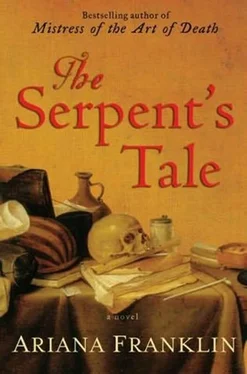“This lady and gentleman come with me,” Adelia told him, “or I don’t go.”
Being in Cambridge again was distressing her. The worst moments of her life, and the best, had passed in this town; the place was haunted by spirits whose bones rested in peace while others still shrieked to a god that hadn’t heard them.
“The dog, too,” she added, and saw the poor messenger’s eyes roll. She didn’t care; it had been a concession to come at all. When she’d stopped off at her house on the way in order to pack suitable winter clothing for them all, she had gone so far as to wash her hair and change into her best dress, shabby though it now was. Further than that, she would not go.
The episcopal residence-the bishop had one in every major town in the diocese-was in Saint Mary’s parish, a building now abuzz with servants preparing it for unexpected habitation.
Followed by the dog, Ward, the three were shown into a large upstairs chamber where dust sheets were now being whisked off heavy, ornate furniture. An open door at its far end revealed the gilt and plaster of a bedroom where footmen were hanging brocade drapes from the tester of a magnificent bed.
One of them saw Mansur looking in and crossed the room to shut the door in his face. Ward lifted his leg and piddled against the door’s carved arch.
“Tha’s a good dog,” Gyltha said.
Adelia hefted the rush basket holding her sleeping baby onto a brassbound chest, fetched a stool, undid her bodice laces, and began the feed. What a remarkable child , she thought, gazing down at it, accustomed to the quiet of the fens yet showing no fear, only interest, amid the hubbub that had been Cambridge today.
“Well,” Gyltha said to her. The two women hadn’t had a moment until now in which to talk privately.
“Exactly.”
“What’s his lordship want with you, then?”
Adelia shrugged. “To look into an attempted murder in Oxfordshire, so Prior Geoffrey said.”
“Didn’t think you’d come for that.”
“I wouldn’t have, but it’s on the king’s orders, apparently.”
“Oh, bugger,” Gyltha said.
“Indeed.” Henry Plantagenet’s was the ultimate command; you could squirm under it, but you disobeyed it at your peril.
There were times when Adelia resented Henry II bitterly for marooning her on the island of Britain so that, having discovered her talents at reading the secrets of the dead, he could use them again. There were other times when she didn’t.
Letters had originally passed between the English king and his royal kinsman, William of Sicily, requesting help for the problem in Cambridge that only Salerno’s investigative tradition could provide. It had been a shock to everybody that Salerno obliged by sending a mistress of the art of death rather than a master, but things had turned out well-for Henry II, at least. So much so that other letters had passed between him and King William requesting-and granting-that Adelia stay where she was awhile longer.
It had been done without her request or permission, an act of naked piracy, typical of the man. “I’m not an object,” she’d shouted at him. “You can’t borrow me, I’m a human being.”
“And I’m a king,” Henry told her. “If I say you stay, you stay.”
Damn him , he hadn’t even paid her for all she’d done, for the danger, for the loss of beloved friends-to the end of her days, she would mourn for Simon of Naples, that wise and gentle man whose companionship had been like a second father’s. And her dog, a much lesser loss but, nevertheless, a grief.
On the other hand, to weight the scale, she had retained her dear Mansur, gained an affection for England and its people, been awarded the friendship of Prior Geoffrey, Gyltha and her grandson, and , best of all, acquired her baby.
Also, although the Plantagenet was a crafty, hot-tempered, parsimonious swine, he was still a great king, a very great king, and not just because he ruled an empire of countries stretching from the borders of Scotland to the Pyrenees. The quarrel between him and his Archbishop of Canterbury, Thomas à Becket, would damn him forever, ending as it had in the archbishop’s murder. But Henry’d had the right of it, in Adelia’s opinion, and it had been disastrous for the world that the Jew-hating, self-aggrandizing, backward-looking Becket’s refusal to allow any reform of the equally backward-looking English Church had driven his king into uttering the dreadful cry “Who will rid me of this turbulent priest?” For immediately it had been taken up by some of his knights with their own reasons for wanting Becket dead. They’d slipped away across the Channel to Canterbury and committed a deed that had resulted in making a martyred saint out of a brave but stupid and blinkered man while, at the same time, giving the Church every excuse to scourge a king who’d wanted to curb its power and allow greater justice to his people with laws more fair, more humane than any in the world.
Yes, they called Henry Plantagenet a fiend, and there were times when Adelia thought he probably was, but she also knew that his ferocious blue eyes saw further into the future than any other man’s. He’d succeeded to the throne of an England blasted and impoverished by civil war and given it a secure prosperity that was the envy of other lands.
It was said his wife and his sons resented and had plotted against him and, again, Adelia could see why-he was so far ahead of everybody else, so quick, that their relationship with him could provide no more than metaphorically clinging to his stirrup as he rode.
Yet when the Church would have put Adelia on trial during her search for the murderer of Cambridge’s children, it was this busy king who’d found time to step in and exonerate her.
Well, so he should, she thought. Wasn’t I saving him trouble and money? I’m not his subject, I am a Sicilian; he has no right to coerce me into his service.
Which would have been an unquestionably reasonable sentiment if, sometimes, Adelia didn’t feel that to be in the service of Henry II of England was a privilege.
Nevertheless, she damned his eyes for him and, for the sake of her child’s digestion, tried to clear him from her mind. Trouble was, the vast room around her reflected a Church that made her angrier than Henry ever could. Here was nothing that was not rigidly and opulently religious-the bishop’s massive chair, a cushioned, gold-inlaid prie-dieu where his lordship could kneel in comfort to the Christ, who’d died in poverty, air stuffy with incense. Urging herself to despise it, Adelia contrasted it with Prior Geoffrey’s room at the priory, which was all the holier for its reminders of the profane-fishing rods in a corner, the smell of good food, an exquisite little bronze Aphrodite brought back from Rome, the framed letter from a pupil he was proud of.
She finished feeding. Gyltha took the child from her to burp it, an occupation both women vied for-there was no more satisfying sound than that tiny belch. Because the newly lit brazier had not yet begun to warm the room, Gyltha added another blanket to the basket before she put it in the shadows to let the baby sleep. Then she went to stand by the brazier and looked around with complacence. “Murder, eh? Old team and old days back again.”
“ Attempted murder,” Adelia reminded her. “And no, they aren’t.”
“Do make a change to go travelin’, though,” Gyltha said. “Better’n a winter iced into they bloody fens.”
“You love winter in the fens. So do I.” Adelia had learned to skate.
“Don’t mean as I can’t enjoy somewheres else.” Old as she was, Gyltha had an adventurous spirit. She gave a rub to her backside and nodded toward the basket. “What’s his lordship going say to our little treasure, then?”
Читать дальше











